I've summarised each of these Liverpool-themed posts below, with links to the full post. Links from each full post lead to my photographs.
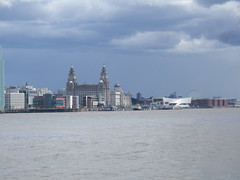
Liverpool viewed from the River Mersey.
'Lion' and OLCO
Part of my interest in Liverpool has been through my involvement with the 'Lion' locomotive 'supporters group', the Old Locomotive Committee (OLCO). 'Lion' is in the care of National Museums on Merseyside and is now a major exhibit at the Museum of Liverpool. You can find all my posts about OLCO and 'Lion' here.
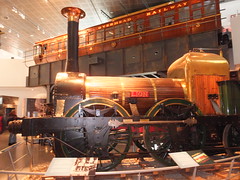
'Lion' and the Liverpool Overhead coach
in the Museum of Liverpool.
By steam to Birmingham
The post 'Black 5' to Birmingham describes what I can remember of a journey in the steam era from Liverpool Lime Street in the 1950s, taking the former L&NWR route via Runcorn, Weaver Junction, Crewe and Stafford to Wolverhampton.

This evocative Ben Brooksbank shot
shows 'Patriot' 45515 at Lime Street.
By train in 2010
To attend an OLCO A.G.M. at the Museum of Liverpool Exhibit Store, I took the L&NWR route to the to the wonderfully-named modern station at Liverpool South Parkway (for Liverpool John Lennon Airport), formerly the rather prosaic 'Allerton' where I was able to change to what was formerly the Cheshire Lines Committee route to Liverpool but which had become part of the 'Merseyrail' network. A Class 350 EMU (25 kV a.c. overhead electrified) took me to Liverpool South Parkway, changing there to a Class 508 EMU (750 V d.c. third-rail electrified) to Bank Hall.
At the Exhibit Store, I was able to study 'Lion' (being readied for display in the new Museum), 'Cecil Raikes' (the massive Beyer-Peacock 0-6-4T which operated on the Mersey Railway prior to electrification), the 'Avonside' 0-6-0T saddle tank (one of the Mersey Docks and Harbour Board shunters) and the preserved Liverpool Overhead Railway Driving/Motor car (also being prepared for display in the new Museum). This trip is briefly described in the post Day Trip to Liverpool.

Bank Hall station (former L&Y Railway).
By train in 2012
Once again, I was attending an OLCO A.G.M., this time held in the new Museum of Liverpool. The A.G.M. is described here. The journey was via the former L&NWR route by a 'London Midland' Class 350 both ways. There's a brief description in the post Liverpool by Train.

Class 350 at Liverpool Lime Street.
Birkenhead and New Brighton by train
For this trip, I took a Virgin 'Pendolino' service to Crewe, a DMU from Crewe to Chester and then a 'Merseyrail' EMU to Birkenhead. I indulged my interest in Scherzer Rolling Lift Bridges by walking extensively around the dock area, looking at three remaining examples of this ingenious design of moveable bridge. 'Merseyrail' then took me on to New Brighton, by which time the weather had deteriorated. I returned to Wolverhampton via Birkenhead and Chester, as my outward journey. The trip is described in three posts - the first is Birkenhead and New Brighton by train (Part 1), with links to the other parts.
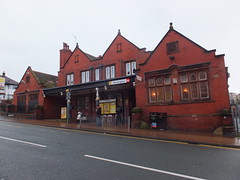
New Brighton station from the roadside.
By train in 2014
This time, I took the former Great Western Railway route from Wolverhampton to Shrewsbury (change) then on to Wrexham General. Another change let me travel on the former Great Central Railway to Bidston. The route from Wrexham to Bidston is now marketed as 'the Borderlands Line. The first three trains had been DMU but at Bidston, I joined a Merseyrail EMU on to Liverpool. I wandered around the city, called in to see if 'Lion' was still safe in the Museum of Liverpool (she was) and then couldn't resist taking the iconic Mersey Ferry to Birkenhead. Another Merseyrail EMU took me to Bebington, where I visited the Lady Lever Art Gallery before taking another EMU to Chester. I returned home via the former Great Western Railway via Wrexham and Shrewsbury. Two posts describe this trip:-
By rail to Liverpool (Part 1)
By rail to Liverpool (Part 2).
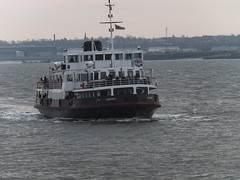
Mersey Ferry 'SNOWDROP'.
Early Days of the Mersey Railway
There's a little history about the Mersey Railway here.
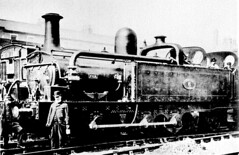
Mersey Railway 0-6-4T 'Fox'.
The Mersey Docks and Harbour Board
There's a short post here.
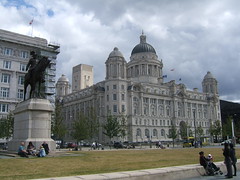
The Dock Office, Pierhead.
Edge Hill, Liverpool
The Edge Hill area of Liverpool has been associated with railways since 1830, when the Liverpool and Manchester Railway opened its first passenger terminus at Crown Street. There's a little about the history and growth of the railways around Edge Hill in the post Edge Hill, Liverpool.
Intrigued to know how much of the original railway infrastructure survived, I re-visited Edge Hill in June 2013 and carried out a fairly extensive walking tour. I reported on what I found in the post Railways around Edge Hill in 2013.
On the Edge Hill Station Site I found a series of photographs which I concluded showed a 'Steam Special' changing engines at Edge Hill in 1954. The post Northern Rubber Special gives my suggested explanation of these intriguing photographs.
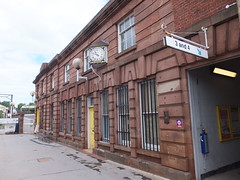
Edge Hill Station Buildings (1836).
Liverpool Lime Street Station
The former L&NWR terminus in Lime Street still retains much of its former grandeur and the two massive trainsheds have been quite well restored. My post Liverpool Lime Street Station gives a little history.
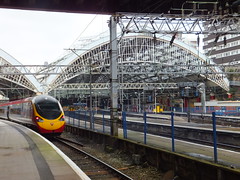
Liverpool Lime Street station.
The other principal stations in Liverpool have not fared so well. The L&Y Liverpool Exchange survives only as a frontage (albeit a handsome one) and little remains of the Cheshire Lines Committee terminus at Liverpool Central High Level. The excellent 'Disused Stations' site features both Liverpool Exchange and Liverpool Central High Level.
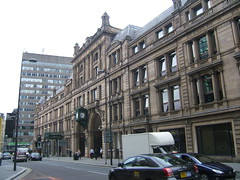
The facade of Liverpool Exchange station today.
More recent posts in this blog
Notes on Liverpool and its Docks.
Merseyside in December.
My pictures
Liverpool area rail.
Merseyrail.
Liverpool.
Birkenhead and its Docks.
New Brighton.
Port Sunlight, Wirral.
Museum of Liverpool.
Royal Visit to the Museum of Liverpool.
Audio Visual Systems at the Museum of Liverpool.
[Updated 30-Dec-2016]
